Five years, five educational projects: briefly about the main and the history of teachers

Recently, Mail.Ru Technopark , the first educational project that we have organized jointly with the MGTU named after N.E. Bauman. During his work, projects were also launched in other strongest technical universities in the country: Mail.Ru Technosphere (VMK MSU), Mail.Ru Technotrack (MIPT), Mail.Ru Technopolis (SPbPU) and Mail.Ru Technoatom (MEPI). In honor of the student's day, which is traditionally celebrated on January 25, we decided to remember how our IT education direction began, how our educational projects appeared and developed, and tell what they are today, and also say thanks to our high schools partners, without which none of this would be. Technopark was the first and several years - the only one. We will talk about it in more detail, because it was at Technopark that solutions and approaches were worked out, which later formed the basis for other projects. And then we give the floor to our teachers.
Technopark
In November 2011, we announced the launch of a “pioneering” educational project. In December, the first group of students was recruited (42 people), by the end of January they formed a team of teachers from the Mail.Ru Group employees and approved the training program. A three-stage selection of students was developed: first, online testing, then an on-site professional interview and HR-interview. Six months later, the first session took place, which was successfully closed by 31 people out of 42. By September 2012, the number of Technopark students had grown to 91 people. True, only 56 of them closed the session.
A year later, in May 2013, Technopark entered the list of the best educational projects according to the RAEC version. By September, the competition for one place was 5-7 people. 168 students gnawed the granite of science. A new curriculum was created, consisting of 16 disciplines, and 24 teachers shared knowledge. In November of the same year, we won the Runet Prize in the Science and Education nomination. Two years later, the first issue took place at the Technopark. From the first set (42 people) we got to the finish line 17. Of these, 14 graduates came to work at Mail.Ru Group. By that time, 223 students had listened to lectures in 19 disciplines in the classrooms of Technopark.
')
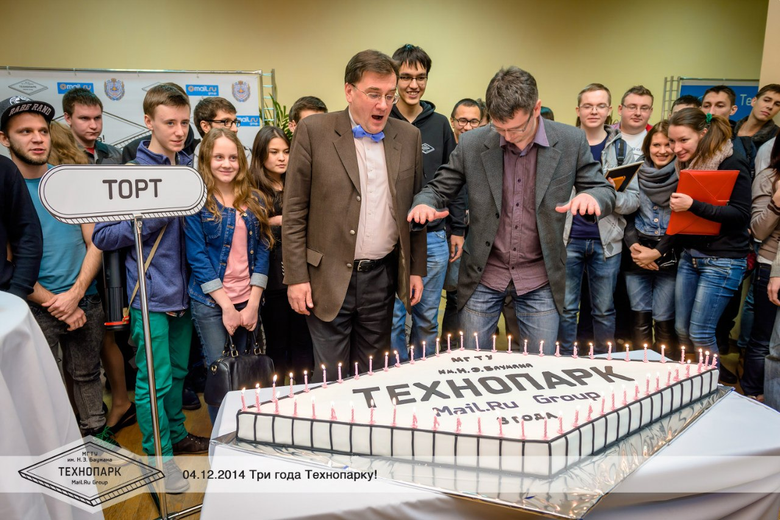
The next frontier is the Technopark for three years. 222 students were trained, they lectured on 22 disciplines. By this time, 40 people had already completed an internship at the Mail.Ru Group and were enrolled in the state. For all students MSTU. Bauman was held championship "Tehnostart", in which it was necessary to create the concept of a mobile web service that makes life easier for students. 250 people took part in the championship, they presented 46 projects.
Technosphere
In February 2014, we launched the second educational project - the Technosphere, which unfolded within the walls of Moscow State University. Lomonosov. Although in many respects we took into account the experience gained in Technopark, Technosphere was not at all blind copying:
- The Technopark program is designed to train web developers and architects of high-load systems, and in the Technosphere grow specialists in the field of big data.
- In the Technosphere take students 2-4 courses.
- Despite the fact that the scheme of entrance exams to all our educational projects is the same (students take an online test and pass an in-person interview), in the Technosphere we focus more on the basic knowledge of higher mathematics.
- In the Technosphere, informal meetings of students with teachers, where you can talk heart to heart, ask about topics of interest, have become a good tradition. These meetings we called Arbors.
At the first recruitment to the Technosphere, the competition amounted to 3 people per seat, and a year later - 5. The first time we scored 42 people, but only 10 of them were able to go to the second semester.
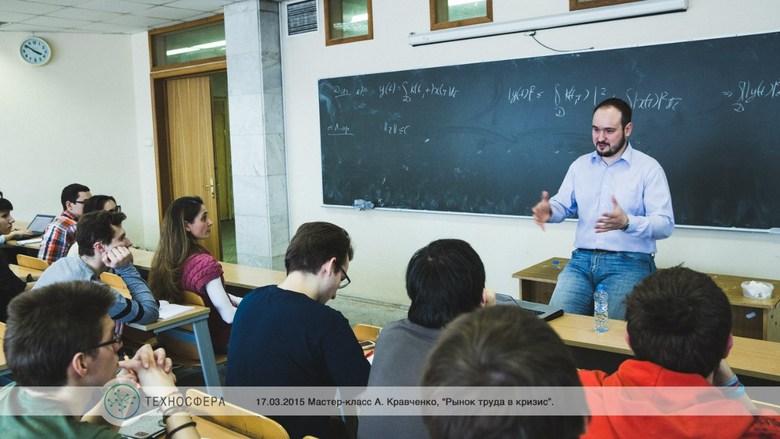
Initially, the training program was designed for one year and consisted of six disciplines: algorithms for intelligent processing of large amounts of data, methods of using the database in the development of Internet applications, multi-threaded programming in C ++, testing, information retrieval and Hadoop. However, a year later, we revised the program and made it biennial. During the four semesters, students study 10 disciplines, performing a large amount of practical work. At the same time, a preparatory course “Algorithms and Data Structures” was developed.
We also created a laboratory where students work with real-life tasks that we face in Mail.Ru Group. For example, they are trying to improve analytical algorithms, to create certain heuristics. That is, they are doing the same thing that they would have done during a regular internship at the company. Since the fall of 2015, research began in the laboratory. For example, the possibilities of using neural networks for solving various business problems are being studied, and implementations of various algorithms are being created.
Technotrack
In September 2015, our third educational project, Technotrek, started at MIPT. This time we did not experiment and immediately developed a two-year program from 12 disciplines. But the selection system was made two-stage: first, online testing, and then a technical interview. In the first set (after the competition 5 people per place) 42 students were enrolled, in the second - 45. Unlike the Technopark and the Technosphere, students from all courses started receiving students at Tehnotrek.
Like the first two projects, Technotrak has its own specialization - mobile development.
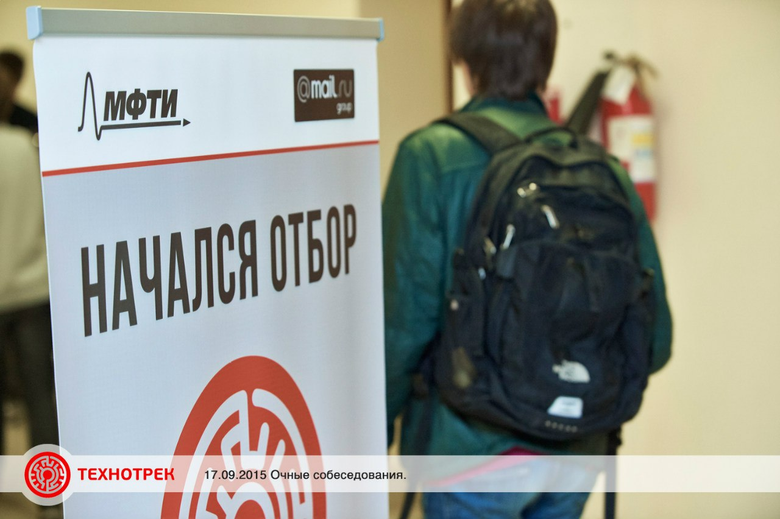
In the spring of 2016, we launched two open courses for all other MIPT students who passed the introductory testing: “C ++ programming” and “iOS application development”. Now there are four open courses in Technotrack: “Linux system administration”, “DBMS in high-loaded projects”, “Introduction to industrial programming and data structures”, “Development of Android applications”.
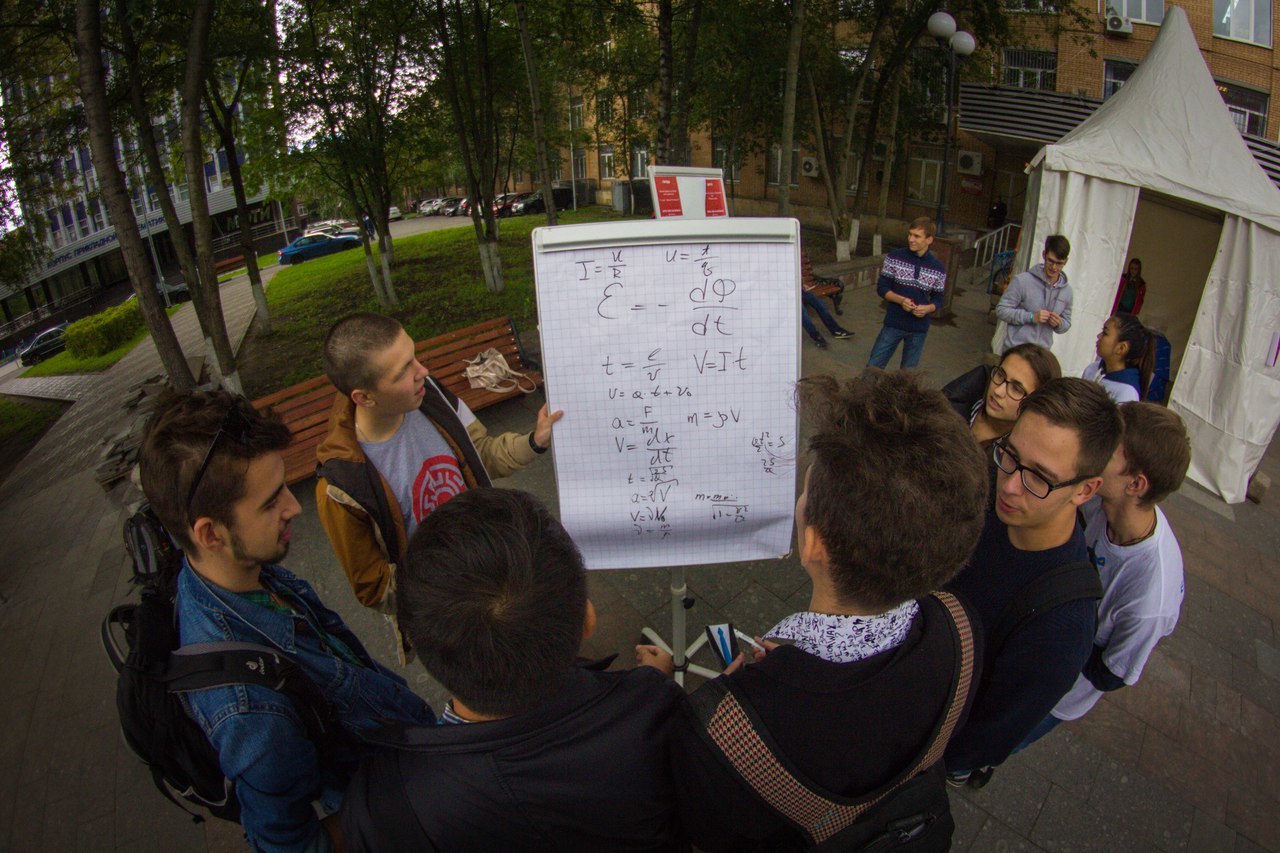
Technopolis
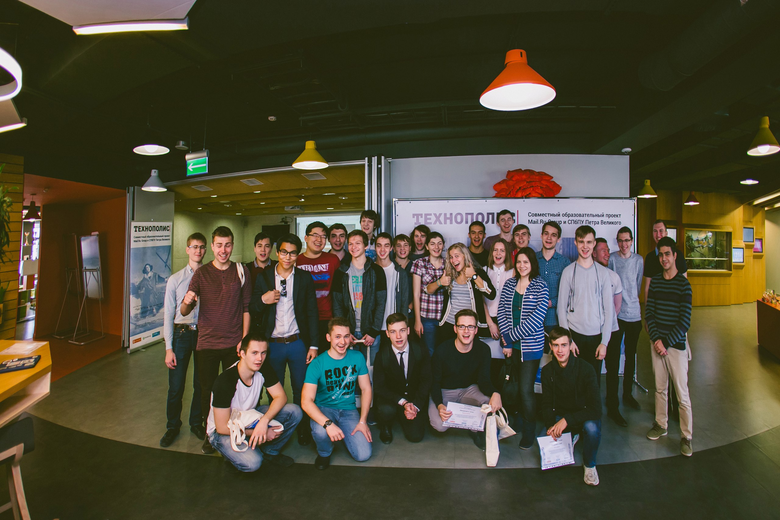
In September 2016, Odnoklassniki launched a new educational project, this time in conjunction with Peter the Great St. Petersburg Polytechnic University. In Technopolis take students of all courses and graduate students. Three-stage selection: questioning with primary testing, then detailed online testing and finally - a technical interview with writing and reading Java code. The first set was taken by 40 students who started a two-year course of study on the design and development of high-loaded Java applications. Also, the first of four open courses - “Introduction to Java” has already been completed. “Mobile development”, “C ++ programming” and “Multi-threaded programming” are also planned.
Technoat
Our fifth educational project - joint with the MEPI - is different from all the others: only open courses operate within its framework, which can be studied after passing the entrance test. Classes are held in a variety of formats: lectures, seminars, webinars, master classes, conferences. Today there are three courses: "Development in Java", "Programming in Python" and "Programming in Perl".
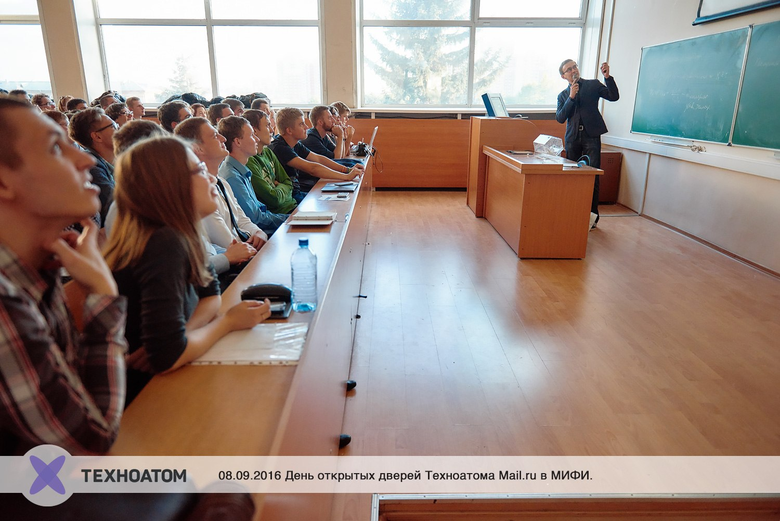
Today, more than 100 Mail.Ru Group employees teach in our educational projects. We decided to ask them about the most memorable moments from the teaching. Their stories read below. And the first word will be said not entirely by the teacher, but by the person who stood at the origins of all educational projects.
Dmitry Dmitry21 Voloshin, ex-director of the department of research and education Mail.Ru Group
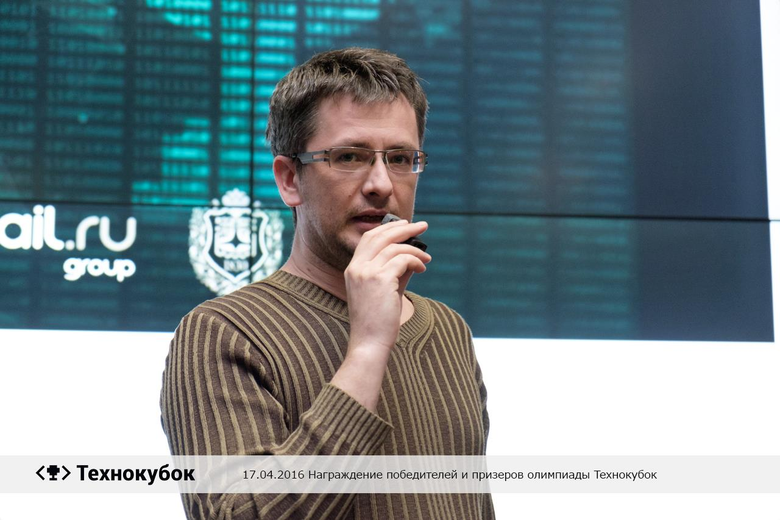
It so happened that I took some part in the construction of the Technopark in MSTU. I mean not so much the creation of an educational process or a training program, but rather construction as such. When in February 2012 I joined the Mail.Ru Group team, I didn’t suspect that I would also be pumping as a foreman. By that time, Volodya Gabrielyan was all in the construction of SkyLight and, sometimes emerging from it, could competently answer questions about the choice of materials or the subtleties of communication with designers. At the same time, we chose the premises for the project at MSTU, coordinated estimates, discussed the color and style of furniture in the classrooms. Preparation for repair lasted for almost half a year. The situation was complicated by the fact that the main educational building (GUK) of MSTU is a historical building, and it is not so easy to rebuild it. On it broke a lot of hotelok. On the part of MSTU, Andrey Proletarsky, the dean of the Institution, ruled the process. We so often swore at the first stages with him that now we are gently friends.
About six months later, we started renovating the premises. From the Rector's bounty we were given a room on the third (rector's) floor of the GUK. It had many undeniable merits, one of which is the height of the ceilings. And one tiny flaw: turned out to be small for our purposes. As it turned out later, we needed at least one in-line audience for 60 people, and the room space was insufficient. Partially this problem was leveled at the expense of transformer audiences (two for 20 people turned into one for 40), but, as you understand, 40 is not 60. And in order to bring the number of students per unit of time to 60, they invented such a trick ears: they decided to make the second floor. Did I mention high ceilings? Well, the engineering university is the same, so we decided to weld a metal structure in the room, which will add another floor to the one-story room.
From the whole process of construction, one episode has sunk into my memory, literally crashed. In the space allocated to us are columns. Carriers that hold on themselves a few more floors above the third rector's. And these columns, unfortunately, are very unsuccessfully located right in the classrooms, partially overlapping the scope of the board for students. At the stage of rough finishing, Dima Grishin and I looked at the premises, rode through wooden lags to these audiences. And of course, they were upset, because nothing can be done and it is necessary to somehow get out, well, for example, to install additional screens with the broadcast of what is happening at the blackboard. Flicked their tongues and left.
It turns out that the workers heard us. They, as it turned out later, the guys are very responsive and heartbroken for the learning process.
When I conducted Dima and returned to the audience, I saw two workers carry one of the columns. My legs gave way. Imagination has drawn GUK developing on my head. I even thought: well, that I'll die here. At least I am not waiting for a conversation with the rector about the loss of part of the premises of MSTU. Coming out of stupor, I spoke. I think Volodya Gabrielyan himself would be pleased with my eloquence. The abusive tirade lasted two minutes, and under no circumstances can I reproduce it. The workers looked at me respectfully and stopped destroying the column. A foreman approached them. It was getting dark.
It all ended, of course, well. The column was sealed, reinforced reinforcement. And now, for almost five years, the best students of MSTU have been studying in these classrooms. But when I go there, no, no, no, I will sneak a peek at the battered column and at the ceiling. Does the HUK stack on my head? Scary the same.
Mitya Osadchuk, lead designer of the Mail business unit and Mail.Ru portal, teaches the course “Designing Interfaces” at the Technopark
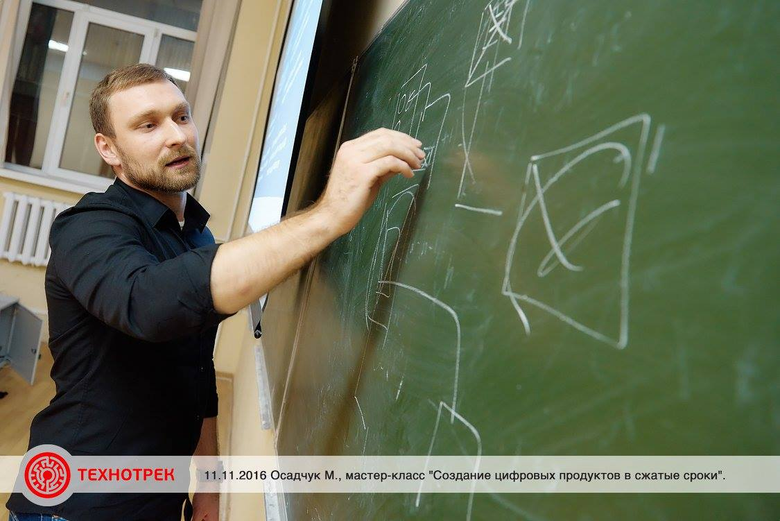
Cheating - the oldest known student art. When you roll up on the exam, it seems as though you are a special agent, ideally undergoing a special operation. I did not teach anything, I prepared a cheat sheet, skilfully answer, the teacher doesn’t notice anything, and you are on the verge of excellent assessment thanks to the super masking skills and the ability to do pokerface in time.
Few people realize, but from the teacher’s side everything looks exactly the opposite. No matter how well the student masks himself, everything is scorched from the very first glance, even starting with how the student came and where he sat. It is clear from the movements, from the look, almost from breathing, who is writing off now. From here one piece of advice - do not amuse yourself, always and everywhere it is clear that you are sly, and not on your skill, but on the teacher it depends whether he burns you or not. Come with knowledge, not with cribs!
Another interesting point is the canteen in Baumanka. The long-forgotten impressions of students. In it, you just get younger with every minute spent in the queue. Belas, smells, prices, everything "as in childhood." Appreciate the student canteen, then you will be bored.
Dmitry nikiasi Isaikin, lead programmer of Mail.Ru mobile Mail, taught the course “Advanced C / C ++ programming” at the Technopark
At the reception interview. I ask the student:
- What do you like to do most in life?
- To drift!
I remember, for a long time and with great interest I told him how he was drifting. It seems we still took this student! I also remember telling the story about one girl, very beautiful, who scored almost full points on preliminary online testing, but at the face-to-face interview there was a complete zero. So, to the question why she acts, if she doesn’t understand anything at all, she sincerely replied: I, they say, girl, I don’t need to know anything, and if you need to do something, you can always ask the guys.
Sergey boogerwooger Prilutsky, lead programmer of the Mail business unit and Mail.Ru portal, teaches the course “Internet Application Security” at the Technopark
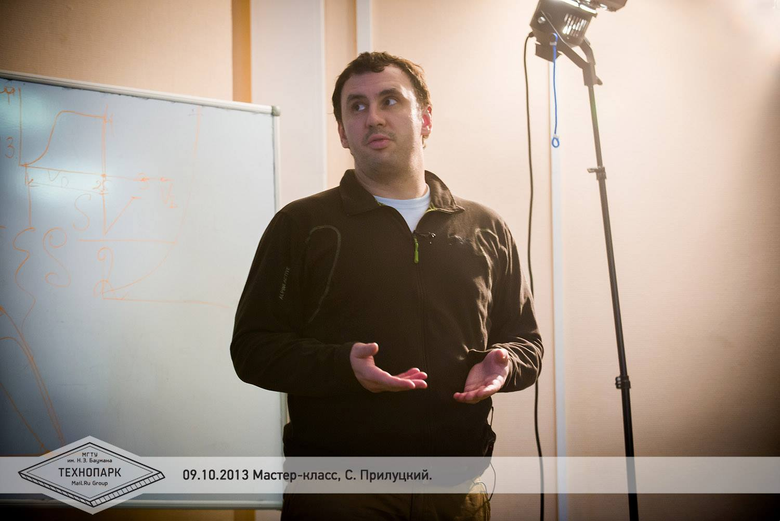
We sit on the control for reversing, students break the samopny crackme, it is necessary to restore the algorithm for generating the serial. They come up, they say: “What a crazy function, trace-trace its code, but it always gives out new values.” I look, I don’t know what the code is, but I need to maintain authority, I answer something like: “Trace carefully”. Already puzzled himself, I sit, suffer. Only after some time I caught up with the fact that we all traced the rand () function here. And - authority.
They gave the students the task: to explore some real web-service and write an essay with recommendations for improving its security. It was assumed that the students lazily poke into forms, cookies, etc. Some did so, but one team got a little carried away digging up an online store, found a SQL injection, XSS, got access to the admin panel, almost sent admin site their password. P - diligence.
Artem bozaro Nawrotsky , lead programmer at the Allods Team, reads the course “Databases” in Technopark
As part of Technopark, I have been running a DBMS course since the fall of 2016. From the interesting so far I can only tell about how I
From the Technopark site I got a general idea of the course program, Pavel Scherbinin took presentations with slides from previous lectures, and preparation began. By the way, the video with the records for this course came from 2013: without them it would be much more difficult to hold the first lectures.
The first lecture and the first control one turned out to be the most difficult from the emotional point of view. The plan of the first lecture in my head took about a week and a half. The problem is that you cannot just go to the blackboard and tell the story on the slides: the lectures are interconnected, and at the end of the current one you need to know what you will say next.
Still a lot of pain came from the purely technical side of the issue: the presentation. The first two months I suffered, correcting the presentation in PowerPoint. The greatest inconvenience caused binding to Windows, and on strictly defined computers with the desired version of Microsoft Office, and syntax highlighting in the source code. In the middle of the course, I found a solution: I reversed all presentations using the Shower ( https://github.com/shower/shower ), and the preparation time for the slides was dramatically reduced. According to my feelings, I managed, although without errors, of course, it wasn’t. I hope that the next semester will be much better.
Alexander gornal Gorny, director of strategy and analysis for Mail.Ru Group, taught a course on web development in the Technosphere, led graduate projects of students in the Technopark
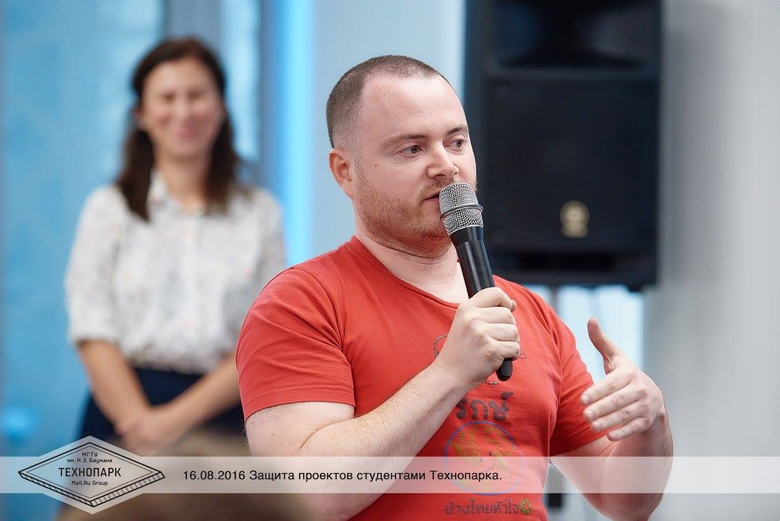
When we launched Technopark, at one of the first events I had to act as a lecturer, to tell you how good the Internet is and the profession of the developer of Internet projects. The colleague who organized the event warned in advance:
- Come to Baumanka. Let me tell you how to find the right audience there.
I told him:
- What I will not find an audience by number?
- Baumanka is difficult, it is difficult to find there, if you do not know.
- I am an adult, why are you fooling me? I can handle.
I come in 20 minutes. Conventionally, I needed audience 302. I go up to the third floor. Here 301, here 303. 302 no. I start to run on the floor - there is no audience. As for evil, the phone at this point sat down, I can no longer ask my colleague for help. I ask passing students: “Where is 302?”. The first one does not know, the second one does not know, the third one says: “Go there and there and there, go down the stairs, climb, it will be 302”. I come, and there is not 302, but 302, and the Mail.Ru Group events are not taking place here. I ask the student here: “Where is the real 302?”. The first one does not know, the second one doesn’t know, the third one says: “Oh, this is such a thing for you in the wing” - “And how to get there?” - “There, here, there, and here it will be. And there you will find. " I am here and there, and I understand that I go in circles.
In short, for 20 minutes I ran along the Baumanka with the sat phone to navigate from passing students. Many times I saw the same window, which overlooks the courtyard, and which I hated with all my heart. I was almost not late, I performed well, but now I firmly remember that Baumanka is difficult.
Anton meph1st0 Reznikov, Mail.Ru Cloud backend development team, leads an open Perl programming course in several educational projects of the Mail.Ru Group
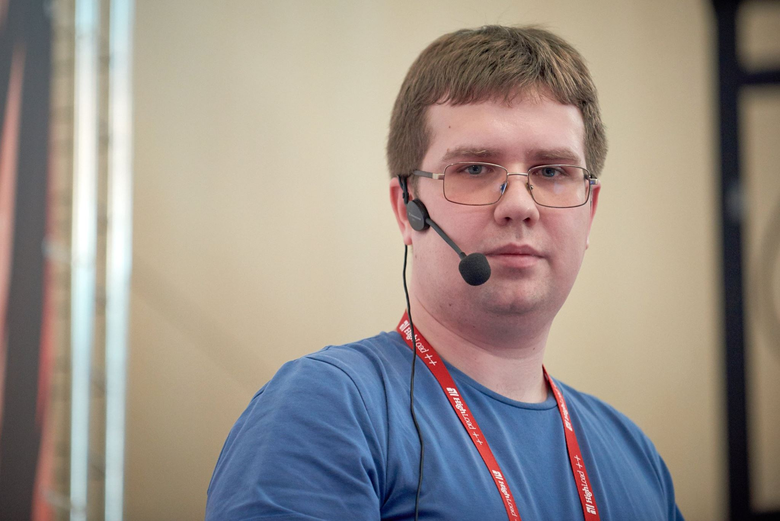
Once I interviewed an intern with a graduate of Tekhnosfera, the time was coming to an end and we smoothly turned to questions about the project. Talking about Tarantool, I showed a piece of billing code for working with the date, where a typo was immediately found.
Instead of “400” it was written “100”, which should have been “shot” in 2100, and our tests covered the period from 2000 to 2099. They laughed, parted. Yes, Vlad, that was the name of that student, he has been working in the Cloud for half a year already.
Pavel dzirtik Sherbinin, technical director of media projects for the Mail.Ru Group, taught the course “Databases” in the Technopark
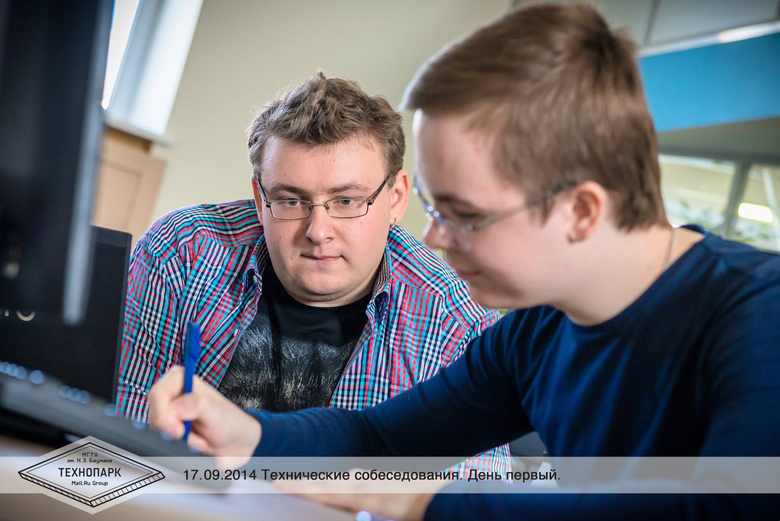
Students sometimes ask very tricky questions, insanely tricky questions, and you understand: you do not know what to answer at all. And it seems that this is your competence, but there is no ready answer. I had such a case: during the course of the assignment, the students and I could not manage to launch the creation of the procedure on one of the student laptops. Could not properly hang the foreign key. And right off the bat, I had no ideas what happened after all, but it was very interesting to find out. The lecture was over, I took the laptop, sat down at the nearest cafe, and there I figured it out, found a mistake. Literally an hour after the lecture, I posted a post on the Technopark portal with an analysis of the situation and a description of the solution:
Hidden text
Today at the seminar we had the following problem:
To deal with it, you need to contact:
Indeed, you cannot make SET NULL for NOT NULL.
Let's try to solve the problem in short order; for NOT NULL, set DEFAULT 0, and translate the events into NO ACTION.
What's again? What now?
Well, for sure!
The definition of user_id is different from the id in the users table.
and
Let's bring everything into conformity:
SUCCESS !!!
CREATE TABLE IF NOT EXISTS `mydb`.`forums` ( `id` INT UNSIGNED NOT NULL AUTO_INCREMENT, `name` VARCHAR(45) NOT NULL, `users_id` INT NOT NULL DEFAULT 0, PRIMARY KEY (`id`), INDEX `fk_forums_users1_idx` (`users_id` ASC), CONSTRAINT `fk_forums_users1` FOREIGN KEY (`users_id`) REFERENCES `mydb`.`users` (`id`) ON DELETE SET NULL ON UPDATE SET NULL) ENGINE = InnoDB; ERROR 1215 (HY000): Cannot add foreign key constraint To deal with it, you need to contact:
mysql> SHOW ENGINE INNODB STATUS; ------------------------ LATEST FOREIGN KEY ERROR ------------------------ 2014-02-26 21:39:44 690 Error in foreign key constraint of table mydb/forums: FOREIGN KEY (`users_id`) REFERENCES `mydb`.`users` (`id`) ON DELETE SET NULL ON UPDATE SET NULL) ENGINE = InnoDB: You have defined a SET NULL condition though some of the columns are defined as NOT NULL. Indeed, you cannot make SET NULL for NOT NULL.
Let's try to solve the problem in short order; for NOT NULL, set DEFAULT 0, and translate the events into NO ACTION.
CREATE TABLE IF NOT EXISTS `mydb`.`forums` ( `id` INT UNSIGNED NOT NULL AUTO_INCREMENT, `name` VARCHAR(45) NOT NULL, `users_id` INT NOT NULL DEFAULT 0, PRIMARY KEY (`id`), INDEX `fk_forums_users1_idx` (`users_id` ASC), CONSTRAINT `fk_forums_users1` FOREIGN KEY (`users_id`) REFERENCES `mydb`.`users` (`id`) ON DELETE NO ACTION ON UPDATE NO ACTION) ENGINE = InnoDB; ERROR 1215 (HY000): Cannot add foreign key constraint What's again? What now?
mysql> SHOW ENGINE INNODB STATUS; ------------------------ LATEST FOREIGN KEY ERROR ------------------------ 2014-02-26 21:46:06 690 Error in foreign key constraint of table mydb/forums: FOREIGN KEY (`users_id`) REFERENCES `mydb`.`users` (`id`) ON DELETE NO ACTION ON UPDATE NO ACTION) ENGINE = InnoDB: Cannot find an index in the referenced table where the referenced columns appear as the first columns, or column types in the table and the referenced table do not match for constraint. Note that the internal storage type of ENUM and SET changed in tables created with >= InnoDB-4.1.12, and such columns in old tables cannot be referenced by such columns in new tables. See http://dev.mysql.com/doc/refman/5.6/en/innodb-foreign-key-constraints.html for correct foreign key definition. Well, for sure!
The definition of user_id is different from the id in the users table.
`users_id` INT NOT NULL DEFAULT 0 and
`id` INT UNSIGNED NOT NULL AUTO_INCREMENT Let's bring everything into conformity:
CREATE TABLE IF NOT EXISTS `mydb`.`forums` ( `id` INT UNSIGNED NOT NULL AUTO_INCREMENT, `name` VARCHAR(45) NOT NULL, `users_id` INT UNSIGNED NOT NULL, PRIMARY KEY (`id`), INDEX `fk_forums_users1_idx` (`users_id` ASC), CONSTRAINT `fk_forums_users1` FOREIGN KEY (`users_id`) REFERENCES `mydb`.`users` (`id`) ON DELETE NO ACTION ON UPDATE NO ACTION) ENGINE = InnoDB; SUCCESS !!!
Vladimir codesign Perepelitsa, architect of Mail.Ru Cloud, reads an open Perl programming course in several educational projects of Mail.Ru Group
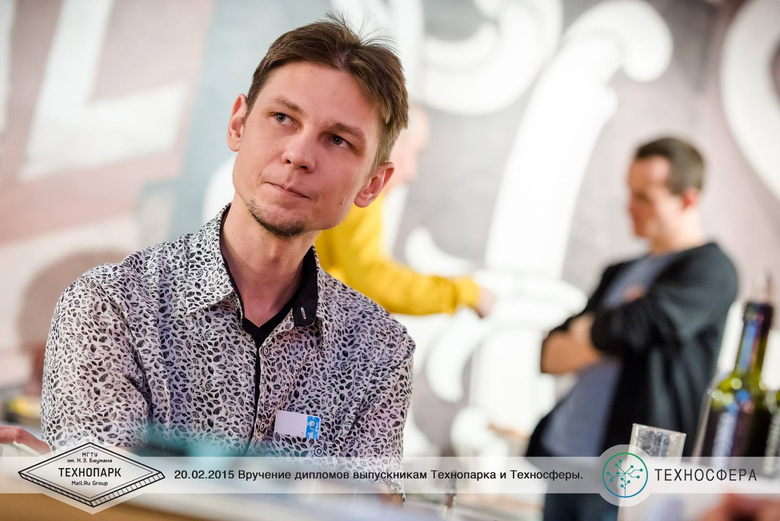
***
I was given a lesson on Saturday - a lecture in the framework of an open course on Perl programming in the Technosphere. I thought that it would begin, as usual, at six o'clock in the evening in the main building of Moscow State University. And on the same day in my office, which is located in the metro area Airport, was training. At three o'clock in the afternoon, one of the students calls and says that he forgot the student ID card at home, they say, could I say something to the security staff I say: "What is the problem? Forgot - go home with him. " He replies: "The lecture is now." - "That is how - now?" - "Well, now, at three o'clock." I decided out of habit at six, and did not look at the schedule. I think: Saturday, I’ll get to MSU quickly. I say: “Actually, I myself am not there, I confused time, but I will soon. Warn students. ” I quickly go down, drive out, drive a way into the navigator, and it shows more than an hour. It turned out that the “Circle of Light” festival was held on the same days. I can not get to MSU, the entrance to the VMK is blocked, but the navigator does not show this. In general, I was late for 1 hour and 20 minutes. But what is most striking: the full audience. Saturday, the course is purely voluntary, the teacher is late, but everyone waited. And although no one reproached, I myself was very ashamed.
***
Conducted a study of how many Perl programmers in the world. We took several analytical kits. For example, how many people visit the CPAN library every month, how many people in the world of programmers according to the labor market data. We received an approximate statistic that 10% of all programmers in the world write in Perl. And throughout our course, we somehow confirm this value for ourselves. Relatively speaking, 40 people came to the first course run - 4 graduates. 70 people came to the second run - 7 graduated. So international research does not lie. :)
Our days
And now, five years have passed since we launched Technopark. Tekhnosfere almost three years, and Tehnotreku soon one and a half. The popularity of projects is also growing, the last time the competition was:
- in Technopark and Technosphere - 9 people per place;
- in Tehnotrek - 6 people in place;
- in the recently launched Technopolis and Technoatom - 5 people in place.
We continue to replenish our video channel with lecture notes, review training programs, conduct 40–50 master classes and individual classes annually. Today there are 10 online courses , they are taught by teachers of Technopark, Technosphere and Technotrack. Thanks to everyone who takes part in our projects: students, teachers, a team in the field of education, participants in open courses and everyone else. Many more interesting things await us!

Source: https://habr.com/ru/post/320350/
All Articles